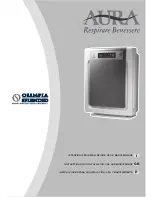
Page 3
STEP 2 – REFRIGERANT PIPING – Flushing
Existing Line Set and Indoor Coil
IMPORTANT
If this unit is being matched with an approved line set
or indoor unit coil that was previously charged with
mineral oil, or if it is being matched with a coil which
was manufactured before January of 1999, the coil and
line set must be flushed prior to installation. Take care to
empty all existing traps. Polyol ester (POE) oils are used
in units charged with HFC-410A refrigerant. Residual
mineral oil can act as an insulator, preventing proper
heat transfer. It can also clog the expansion device
and reduce system performance and capacity. Failure
to properly flush the system per this instruction and the
detailed Installation and Service Procedures manual will
void the warranty.
Flush the existing line set per the following instruc-
tions. For more information, refer to the Installation
and Service Procedures manual. CAUTION - DO NOT
attempt to flush and re-use existing line sets or indoor
coil when the system contains contaminants (i.e.,
compressor burn out).
If a new line set is being installed, size the piping per table 2.
NOTE
-
When installing refrigerant lines longer than 50
feet, refer to the Refrigerant Piping Design and Fabrica
-
tion Guidelines manual or contact the Technical Support
Department Product Application group for assistance.
NOTE
-
For new or replacement line set installation, refer
to Service and Application Note - Corp. 9112-L4 (C-91-4)
.
WARNING
When using a high pressure gas such as
nitrogen to pressurize a refrigeration or air
conditioning system, use a regulator that can
control the pressure down to 1 or 2 psig (6.9
to 13.8 kPa).
WARNING
Refrigerant can be harmful if it is inhaled. Refrigerant
must be used and recovered responsibly.
Failure to follow this warning may result in personal
injury or death.
WARNING
Fire, Explosion and Personal Safety hazard.
Failure to follow this warning could result in
damage, personal injury or death.
Never use oxygen to pressurize or purge
refrigeration lines. Oxygen, when exposed
to a spark or open flame, can cause fire and/
or an explosion, that could result in property
damage, personal injury or death.
WARNING
Polyol ester (POE) oils used with HFC-410A refrigerant
absorb moisture very quickly. It is very important that the
refrigerant system be kept closed as much as possible.
DO NOT remove line set caps or service valve stub caps
until you are ready to make connections.
LIQUID LINE FILTER DRIER INSTALLATION
4AC14L(S)36 to 60 Units only.
NOTE
–
The 4AC14LS18 to 30 units have a factory in-
stalled suction filter drier. A liquid line filter drier is not re
-
quired on the 4AC14LS18 to 30 units.
The liquid line filter drier, when provided, must be field in
-
stalled in the liquid line between the outdoor unit’s liquid
line service valve and the indoor coil’s metering device
(fixed orifice or TXV) as illustrated in figure 4. This filter
drier must be installed to ensure a clean, moisture-free
system. Failure to install the liquid line filter drier, when
provided, will void the warranty. A replacement filter drier
is available. See Brazing Connections page 6 for special
procedures on brazing filter drier connections to the liquid
line.
OUTDOOR
UNIT
LIQUID LINE
SERVICE VALVE
LIQUID LINE
FILTER DRIER
LINE
LIQUID
LINE
BRAZE CONNECTION POINTS
4AC14L(S)36 - 60 units only.
(Not required on 4AC14LS18 - 30 units.)
FIGURE 4. Typical Liquid Line Filter Drier Installation
FIXED ORIFICE (RFC) LIQUID LINE SOLENOID
VALVE INSTALLATION
4AC14LS18 to 30 units equipped with a fixed orifice (RF
-
CIV) metering device require installation of liquid line so-
lenoid valve kit #17A09. Refer to liquid line solenoid valve
kit installation instructions 507807-01.


































